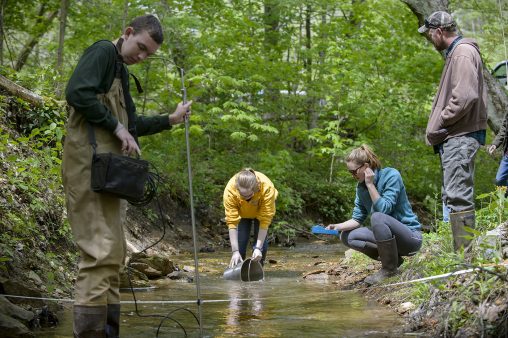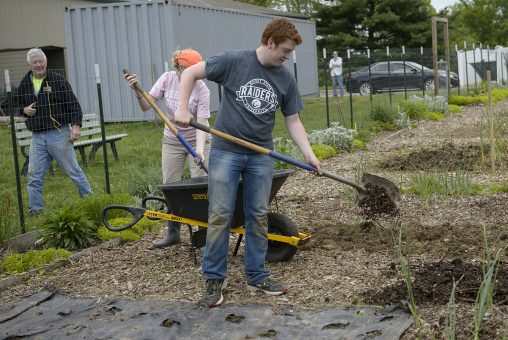A storefront in the tiny southeastern Ohio village of New Straitsville pulses as a nerve center of efforts to undo the environmental ravages of pre-regulation coal mining. Inside, three Wright State University students cluster around a watershed coordinator, peppering him with questions about their role.
The students are about to take water samples from Monday Creek, which at one time was said to be “dead as a bag of hammers” due to acid mine drainage. The small Monday Creek Restoration Project (MCRP) storefront provides plenty of inspiration for the students to help reclaim the creek.
Maps of coal mines and waterways are pinned to the walls. Bookshelves sag with white, black and blue binders filled with sampling results. Wading boots caked with stream sediment and creek-bank mud stand at attention in a back room.
“This is an internationally known project,” said Nate Schlater, Monday Creek watershed coordinator for Rural Action, a nonprofit that covers Ohio’s 32 Appalachian counties and is also engaged in social and economic initiatives. “We need volunteers to help keep this work going.”
The Wright State students — Kelly Mutterspaw, Nellie Peshian and Kyle Turner — soak it all in. They are among 10 students who are part of a community service project connected to an interdisciplinary sustainability course in Wright State’s Honors Program.

From left, Wright State students Kyle Turner, Nellie Peshian and Kelly Mutterspaw, and Tim Ferrell, Monday Creek water quality specialist for Rural Action, take water samples during a community service project connected to an interdisciplinary sustainability course in the Honors Program. (Video by Kris Sproles/Photos by Will Jones)
In its eighth year, the course examines economic, social and environmental issues facing residents of Appalachia. The course culminates with a week of community service in southeast Ohio, with projects ranging from environmental remediation such as cleaning up dumps and collecting discarded tires to planting community gardens.
The course was initially designed by Sarah Twill, professor and chair of Social Work, and Hunt Brown, senior lecturer emeritus in the Department of Earth and Environmental Sciences and special assistant in the Office of the President.
“They get out of this a much greater understanding of the complexity of issues that they may have taken lightly before,” Brown said of the students, who this year are majoring in psychology, social work, nursing and various engineering disciplines. “There is a greater understanding of poverty, the reasons for poverty and the way social, economic and environmental factors all interrelate.”
At the MCRP office on this day, May 3, the students prepare to leave for Monday Creek, a 27-mile stream that flows from Perry County into the Hocking River in Athens County. Green fishing nets with long aluminum handles clatter as they are collected and dropped into the back of a white pickup truck along with boots, a stainless steel pail and metal measuring stick.
The truck and a caravan of other vehicles weave their way along a twisting, two-lane highway that goes from blacktop to dirt and gravel, sending up clouds of dust as they make their way to Monkey Hollow. Once there, the students check out a doser – a silo-like structure that feeds crushed limestone into Monday Creek to reduce the acidity. They then take water samples and measurements.
There are more than 21,000 acres of abandoned coal mines in the Monday Creek Watershed. Water that comes out of the mines contains sulfuric acid, iron and aluminum, a combination that can kill fish, bugs and other aquatic life.
In 1994, only four species of fish were still living in Monday Creek. But thanks to government funding and programs, 16 water treatment systems have been installed along the creek since 1994 to neutralize the acidity, making the water more livable to aquatic life. Today, there are 36 species of fish in the creek.
Mutterspaw, of Xenia, graduated in April with her bachelor’s degree in biomedical engineering and is preparing to begin studies for her medical degree at the Wright State Boonshoft School of Medicine.
“From today’s experience I’ve gotten a better understanding of what impacts people can have on the environment,” she said. “Coal mining in the 1800s is still affecting today’s creeks.”
In addition to watershed reclamation, Rural Action is involved in environmental education, zero waste/recycling, sustainable agriculture and sustainable forestry.
“As a membership-based organization with very limited capacity, volunteers are a major part of what we do,” said Schlater. “We’re hoping to gain support for this work by introducing folks to this. We have literally seen people change their career paths after spending a summer with us.”
Brown believes the community service projects not only offer educational eye-opening experiences for the students, but also teach them community engagement skills that can lead to community activism and service later in life.
Mutterspaw hoped she could help the residents in some small way during her week of service.
“But I think I’m actually getting more out of this than I’m giving to other people,” she said. “I’m learning a lot more about the Appalachian region, the way people live and just how hospitable and welcoming these people are.”
“I want to learn to be a better giver, to understand what’s going on around me,” added Turner, a materials engineering student from Jackson, Ohio.
In nearby Athens, at the Athens County Public Library, Wright State students were helping label the library’s fiction collection by genre so it is easier for the patrons to find the books for which they are looking. A couple of local volunteers were also helping in order to accumulate points redeemable for food, appliances and even cars at Good Works, Inc., a local poverty fighting organization.

From left, Hunt Brown, senior lecturer emeritus in the Department of Earth and Environmental Sciences, and Wright State students Sarah Downing and Sean Tomlin work at a community garden in Athens.
Maureen Barry, First-Year Experience librarian at Wright State, is an important part of the Honors course, providing a unique perspective on literacy issues. She said libraries are crucial in Appalachia because they not only supply books, but also narrow the digital divide by providing computer access and teaching residents how to search the internet and fill out applications online for jobs and social services.
“It’s the one place where all people are welcome,” Barry said. “People are so relational in this community. They really need a personal connection to feel comfortable in places, so I think the library staff plays a very important role.”
Barry said the Wright State students are seeing their coursework come to life.
“We can talk all we want about this stuff in the classroom,” she said, “but until you actually experience it and build relationships with people here in the community, it isn’t as impactful.”
Across town, Sarah Downing, a nursing major from Vandalia, and Sean Tomlin, an industrial and systems engineering major from Lewisburg, help plant a community vegetable garden on a hill next to an apartment complex in conjunction with Community Food Initiatives, another nonprofit seeking to ensure healthy local foods to area residents. The carrots, radishes and other produce will be donated to food pantries and schools.
Music professor Christopher Chaffee, making his debut with the course this year and offering an additional perspective to the course, was spreading mulch and otherwise getting his hands dirty as part of the effort.
“We’ve talked a lot in the class about resources available to help people,” said Chaffee. “This puts it in real sharp focus. What we did today is just an extension of the classroom.”


 Wright State alum Lindsay Aitchison fulfills childhood space-agency dream
Wright State alum Lindsay Aitchison fulfills childhood space-agency dream  Wright State business professor, alumnus honored by regional technology organizations
Wright State business professor, alumnus honored by regional technology organizations  Wright State University Foundation awards 11 Students First Fund projects
Wright State University Foundation awards 11 Students First Fund projects  Gov. DeWine reappoints Board Treasurer Beth Ferris and names student Ella Vaught to Wright State Board of Trustees
Gov. DeWine reappoints Board Treasurer Beth Ferris and names student Ella Vaught to Wright State Board of Trustees  Joe Gruenberg’s 40-Year support for Wright State celebrated with Honorary Alumnus Award
Joe Gruenberg’s 40-Year support for Wright State celebrated with Honorary Alumnus Award 